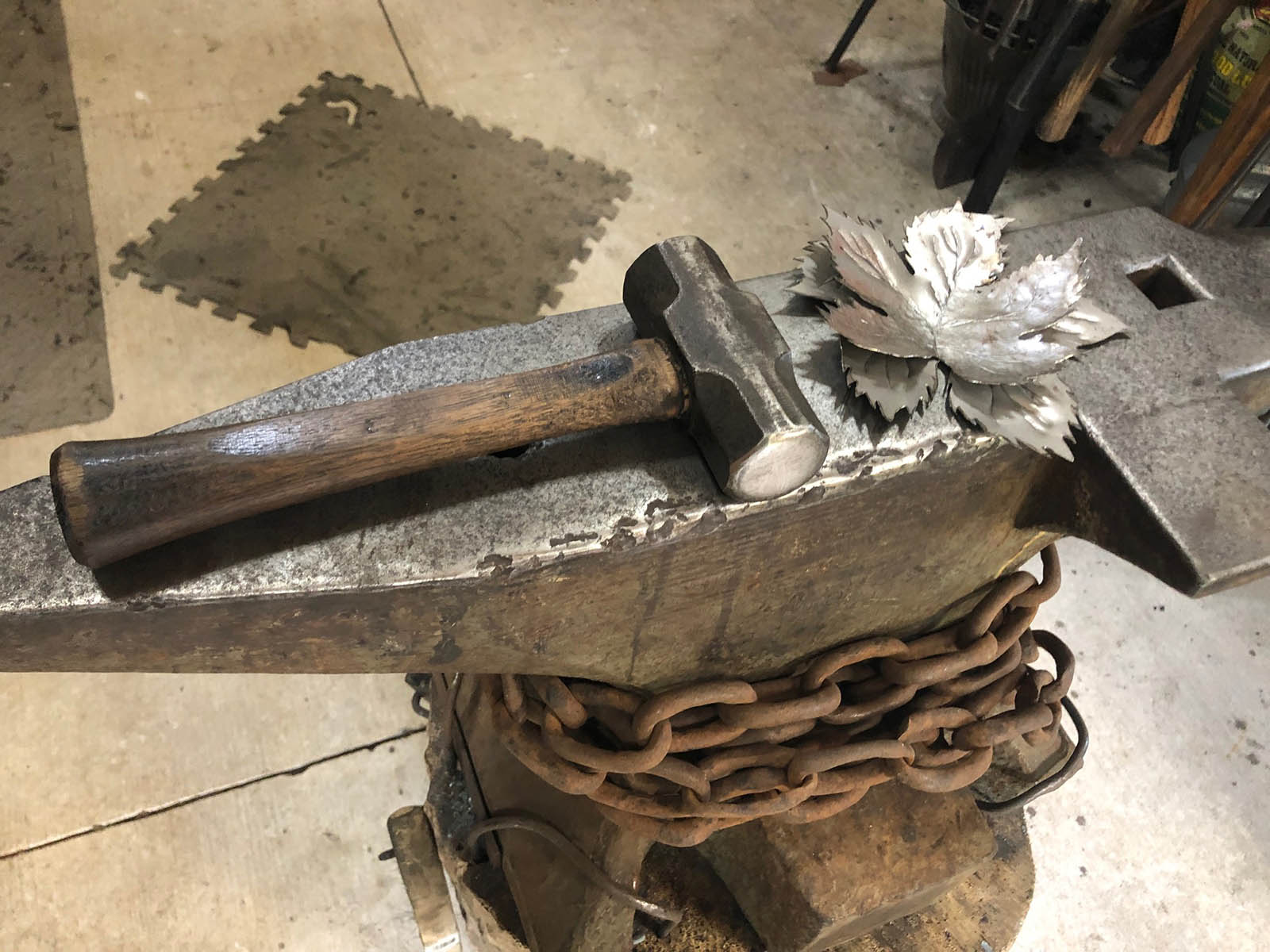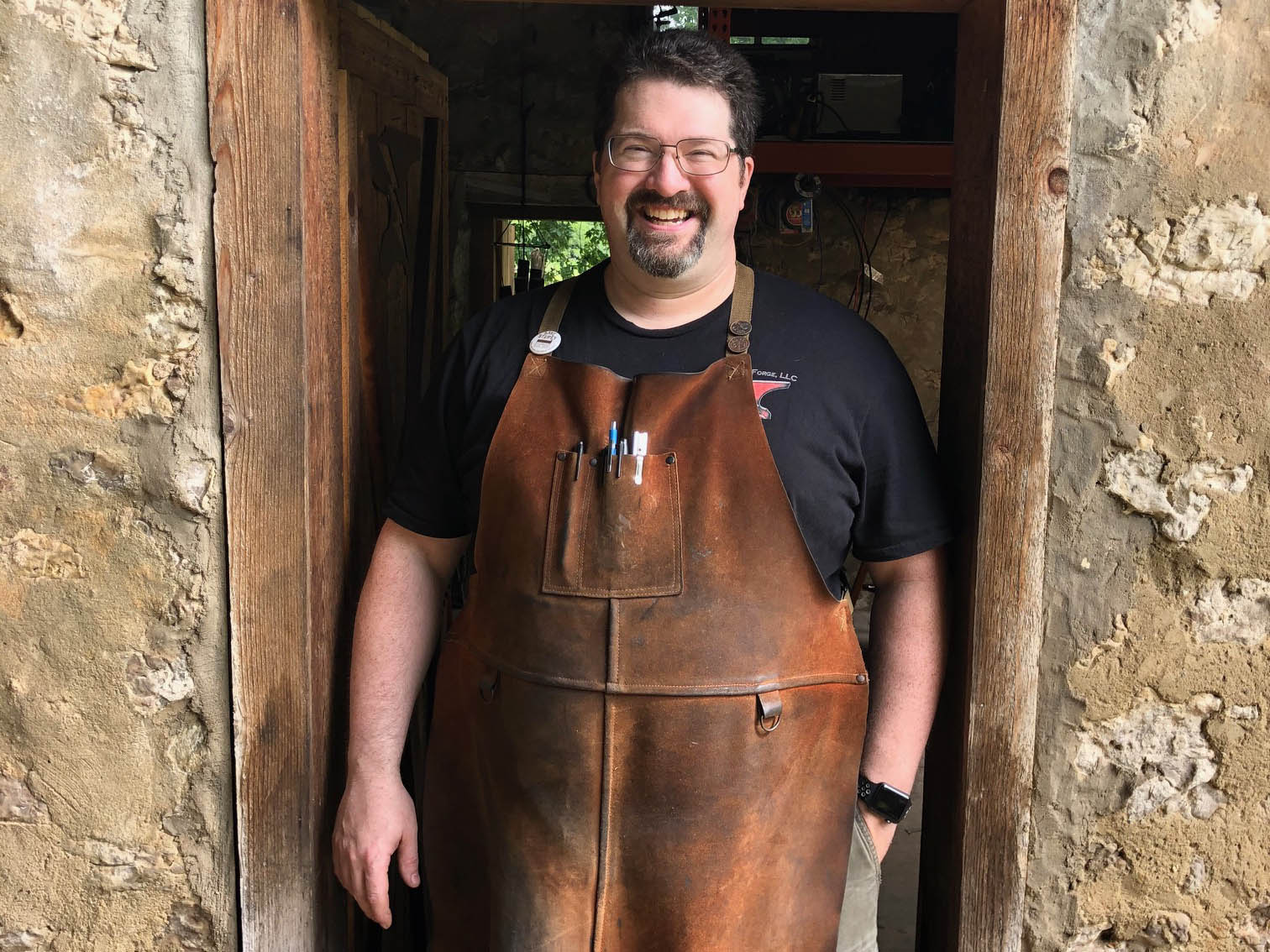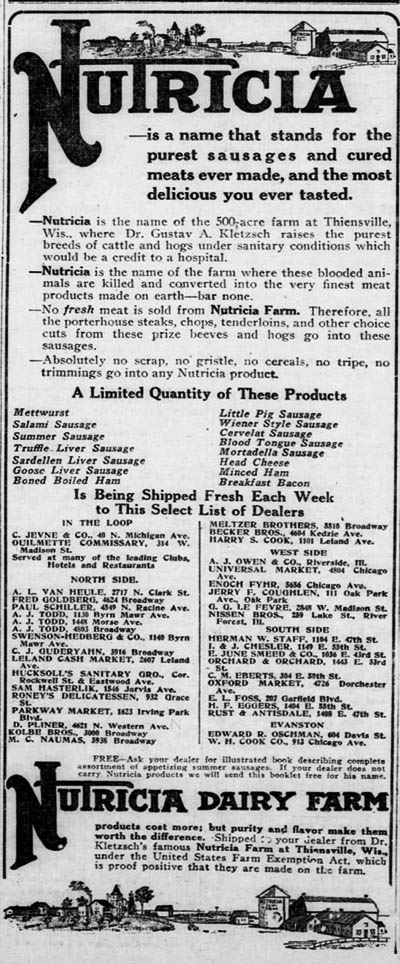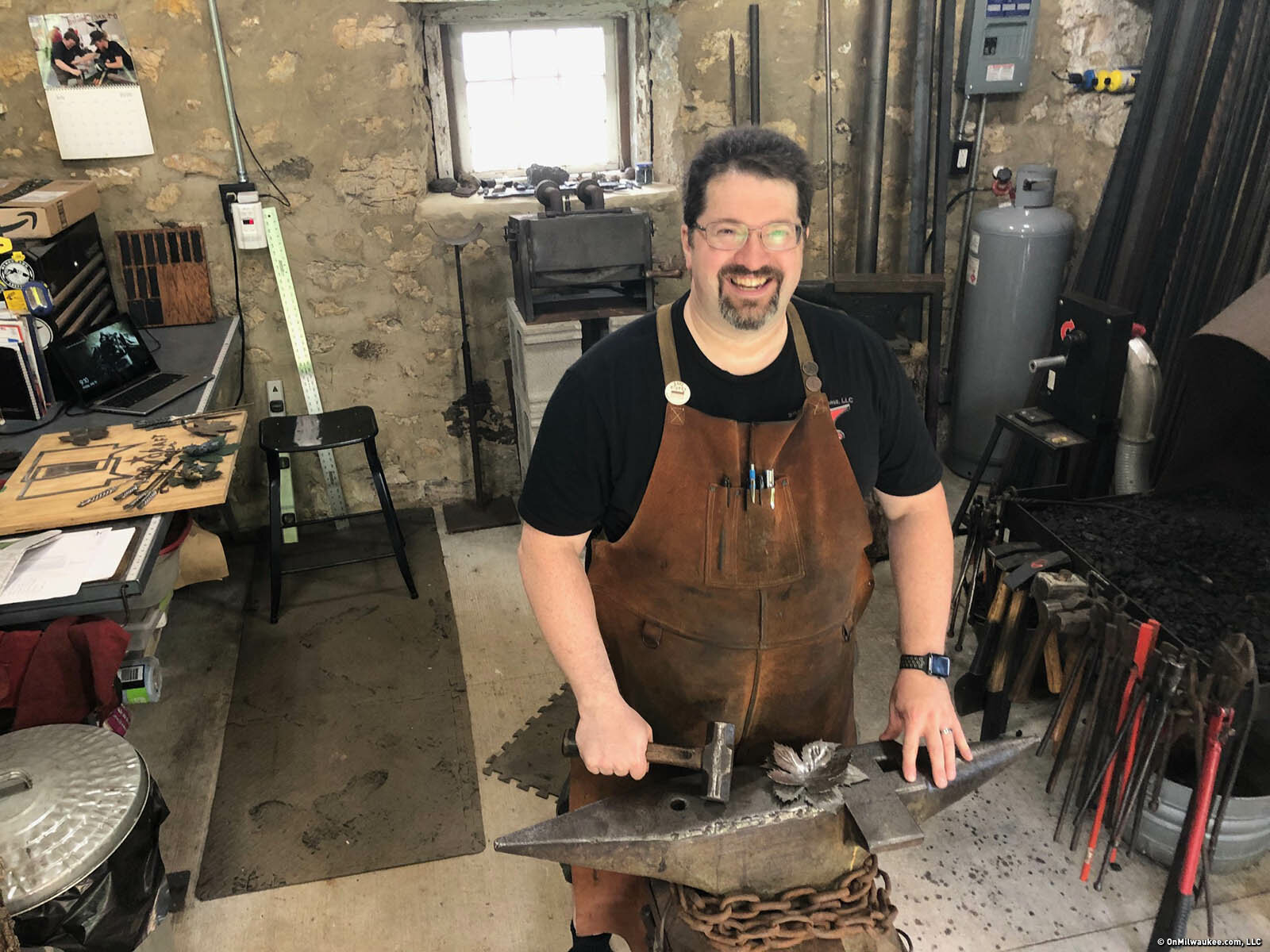Tucked away behind an unassuming home on a leafy Mequon road is a small but stunning former dairy farm outbuilding constructed of local stones.
Inside, hammering away in a well-organized workshop with two different types of forges, a variety of tools and an anvil in the dead center of the space, is StormCloak Forge’s Sam Laturi, the only blacksmith in Ozaukee County these days.

In his brown leather apron, Laturi comes out to greet me and to tell me how a yooper from Iron River, Michigan, who arrived in the Milwaukee area to work in IT, ended up spending his days in hammering metal in a blazing hot smithy ... in 2020.
"I went to school for business management," Laturi tells me, with what I soon learn is a smile he wears as easily as that apron. "My parents owned a nursing home. They were second generation (owners). I was looking at being third generation owner, so I went to school for it.
"My junior year, my mom called up and said, 'Great news. We sold the nursing home.' And I said, 'Wow, there goes my life plan.' By my senior year, I just had electives to fill. I took blacksmithing as a free elective."

Laturi immediately fell in love with it, and began learning more and more, and practicing it as a hobby. In his Shorewood apartment he did cold blacksmithing work, like making chain mail shirts.
"I went into IT (and) was working for Horizon Home Care and Hospice, and I talked about blacksmithing to anybody that would listen," he says. "One of our chaplains overheard me talking about it one day. He happened to work down at Timber-lee Youth Camp in East Troy. They have a full time blacksmith, or did.
"He asked me one day, 'Hey, you want to go meet (him)?' So I went down there on a Saturday, walked into the smithy, and Greg (Meeker) and I sat down. Four and a half hours later he says, 'Well, I better get to dinner. You coming back next Saturday?' That was seven years that I apprenticed with him.
During that time Laturi ran his side business out of his apartment, creating an Etsy store, and renting booths and tables at art shows, where he'd sell simple items like bottle openers and roses.

(PHOTO: Sam Laturi)
And then, eight years ago, he found the former Nutricia Farms homestead, which consisted of the 1838 farmhouse and the 1844 stone building which was, at the time, still attached to an 1850 three-story barn, though the top two stories had caved in.
The farm, which had, at one point, covered 500 acres, was owned by Ephraim Woodworth when the buildings were erected, but the Nutricia name comes from Dr. Gustav Kletzch, a German immigrant, who owned it from 1906 to 1933.
Kletzsch, who had studied medicine in Germany and, later, in New York, used the dairy farm’s milk to make baby formula in the very building in which Laturi now works.
Though the baby formula idea tanked, Kletzsch switched to a business delivering milk to customers’ homes and grew successful enough that it was later acquired by the Gridley Dairy in 1922.
At that point, Kletzsch veered again, turning the small stone building into a headquarters for his butchering business, which endured until his death in 1933. At that point much of the land was sold to the Nieman Co., which had a variety of concerns, including raising foxes for fur, a canning business and, later, a pet food company.
"When we bought the house eight years ago, this had three walls because it was attached to the milk barn," says Laturi, who says some old timers have stopped in over the years.

(PHOTO: Sam Laturi)

"I've had people come to my open houses that remember coming here with their dad. One guy told me they parked alongside and they'd walk in and they'd buy pork and whatnot from the butcher. From the '60s until we bought it, it sat empty. The original roof had split and it was starting to fall apart. After the barn was gone, the roof was taken off, it was just those three walls, that's it. That's when we started."
Laturi and his wife Sara spent 13 months getting the building into shape.
Sara has been a key player in the business, says Laturi. "She's been the wind behind me, pushing me along, telling me I can do this ... the voice of reason.
"I had this for a year and a half, and the blacksmithing was getting in the way of the day job," he says. "That was just going downhill. Every time I went to my doctor literally the first words out of his mouth were, ‘Did you quit your job yet?’ He could tell how bad it was affecting my health.

"So anyway, one day I had a really bad day. I went to lunch, and I called my wife and I said, ‘I'm going to quit. I'm done.’ And she said, ‘It's about effing time. I've been waiting five years for that.’
Now, Laturi has transitioned from making tchochkes to more involved work for bigger clients. Again, he has Sara to thank for that.
"I think every small business goes through that stage where you're just doing anything for anyone you can because you're so hungry for the business," says Laturi. "It got to the point where I couldn't do that. We had a really bad show down at the (State) Fairgrounds. It was 18 hours and I walked away with literally $70.
"I was crestfallen, to say the least, driving home. My wife, she's talking to me up the whole time, all the way home. She says something that really hit me. She says, ‘Okay, you have to decide, who do you want your clients to be? Because you're going to have to start saying no. Do you want to have the high-volume, low-dollar customer that's just buying bottle openers from you? Or do you want the customers that, they don't care about the price. They want something custom, unique, no one's ever had this before, exactly what their vision is, etc., etc.’ And I said, ‘Well, I'm trying to be an artist here. That's what I want.’ She knew."

So now, Laturi is making door handles and grates and decorative elements for the still-expanding Foxtown Brewery on Mequon Road, and he’s making special orders for customers, who he says, have some time to get work around the house done, thanks to the pandemic shutdown, and are spending a little extra to have the kind of unique, bespoke, handmade objects he can create.
That’s allowing him to flex his creative muscles and expand his skills and horizons in the smithy.
"Even when I was doing all the IT work, and before I was doing IT work, I was doing graphic art and design. I'd have to draw, I'd have to sculpt with clay, I'd have to do something creative. If I went a month or two without creating something, I just got twitchy. You know what I mean? I have to create something.

"I took painting. I took art in high school, that sort of thing, but when I took that blacksmithing class in college, the very first day we sat down, Dale Wedig, who was the professor – he still teaches up at Northern Michigan University – says, 'Okay, grab a hammer. All the rest of the tools you're going to make yourself.’
"I was like, okay, this is cool. And the very first time I pulled that steel out, and I started hitting it and it started moving where I wanted it to, that was it. Because I took a permanent object, I manipulated it into a new permanent object, and I'm like, ‘this is it. This is awesome."
Laturi has been invited to do talks about blacksmithing around the area, which has led him to study the history of it in the region and he’s taken on apprentices, too. At the moment there are three of them, their gloves hanging on hooks on the back of the door (just below the upper window sill where Laturi tosses his spent work gloves for posterity).

"Currently, I'm it. I'm the only blacksmith (in the county), so I kind of feel like all those individuals that were blacksmithing and creating some pretty awesome stuff. The torches that they carried, there's nobody else. I'm kind of carrying those torches right now.
"I try to let everybody know that (blacksmithing) is still going and I'm trying to pass it on. I have one apprentice, Eric, who's over in Germantown, so he's not in this county; that kid is so good. Funny story, too: he's in IT right now, as well, and I'm like, YES!"
You can find Sam Laturi’s StormCloak Forge at stormcloak.com and on Etsy.
Born in Brooklyn, N.Y., where he lived until he was 17, Bobby received his BA-Mass Communications from UWM in 1989 and has lived in Walker's Point, Bay View, Enderis Park, South Milwaukee and on the East Side.
He has published three non-fiction books in Italy – including one about an event in Milwaukee history, which was published in the U.S. in autumn 2010. Four more books, all about Milwaukee, have been published by The History Press.
With his most recent band, The Yell Leaders, Bobby released four LPs and had a songs featured in episodes of TV's "Party of Five" and "Dawson's Creek," and films in Japan, South America and the U.S. The Yell Leaders were named the best unsigned band in their region by VH-1 as part of its Rock Across America 1998 Tour. Most recently, the band contributed tracks to a UK vinyl/CD tribute to the Redskins and collaborated on a track with Italian novelist Enrico Remmert.
He's produced three installments of the "OMCD" series of local music compilations for OnMilwaukee.com and in 2007 produced a CD of Italian music and poetry.
In 2005, he was awarded the City of Asti's (Italy) Journalism Prize for his work focusing on that area. He has also won awards from the Milwaukee Press Club.
He has be heard on 88Nine Radio Milwaukee talking about his "Urban Spelunking" series of stories, in that station's most popular podcast.



